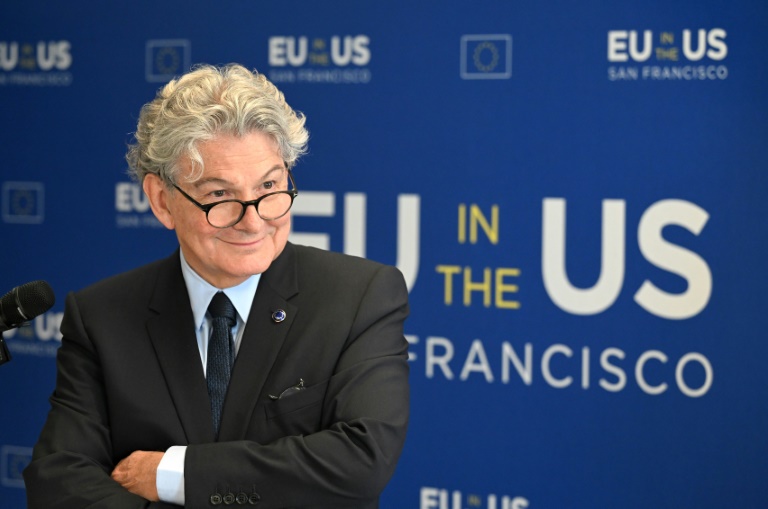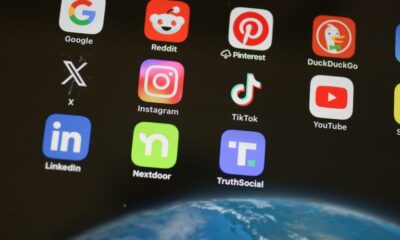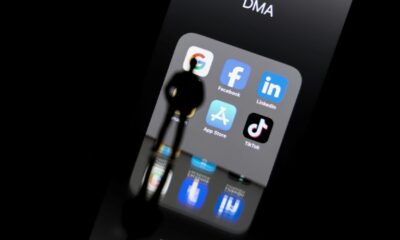The European Union’s self-styled digital enforcer, Thierry Breton, doesn’t mince his words when it comes to big tech.
From sending warning letters to the heads of the world’s biggest platforms to sparring on social media with the billionaire boss of X, Elon Musk, Breton appears to be enjoying his new status as the EU’s man taking on the giants.
With his distinctive, salt and pepper mane and his eyes framed by thick black glasses, the Frenchman’s star is in the ascendant as the EU’s powerful legal weaponry against tech titans comes into force.
Breton, 68, is the EU internal market commissioner, a role he has held since 2019, and his portfolio includes digital and industry issues.
He has been in the spotlight in recent weeks after the launch of the first investigations under a new EU law into X (formerly Twitter), Facebook owner Meta and TikTok over the spread of false information and hate speech following the Hamas-Israel conflict.
He has also been at the forefront of the push to ramp up arms production in Europe following Russia’s invasion of Ukraine last year.
A former CEO of French tech and telecom firms, Breton was the first major business leader to arrive in the cosy world of the European Commission, the EU’s executive arm, and has since become very media savvy.
He wants to be seen as a disrupter who can effect change.
He frequently gives interviews to media and has mastered the art of a quick quip on social media, even going head-to-head with Musk.
– Waving chips –
The media success of Breton has confounded some since he is not as eloquent an orator as some other top officials in Paris and Brussels.
He is at times mocked for the length of his speeches and for the multiple ideas he introduces all at once in a disorderly fashion.
But Breton is in his element when he talks about digital issues and industry, after serving for several years as the head of several large French companies including France Telecom — now Orange — and Atos.
An engineer by training, the commissioner once had a wafer of semiconductor material in his hand as he launched into a long, technical explanation of electronic chips.
Breton, however, did not have a smooth path into the commission.
The former French finance minister was actually French President Emmanuel Macron’s second choice after a scandal surrounding his first.
Now, he has the ear of European Commission President Ursula von der Leyen.
The EU’s landmark laws taking on mainly US-based web giants, the Digital Services Act (DSA) and the Digital Markets Act (DMA), are one of Breton’s biggest achievements.
The rules will demand better policing of content online and they will curb the market powers of companies, like Amazon, Apple, Google, Meta and Microsoft.
“It’s time to put some order in the digital ‘Wild West'”, he said in 2022.
Last year Breton went to see Musk in Texas to explain the rules that he would have to follow under the DSA. They were all smiles in a video that went viral. “We are very much on the same page,” Musk said.
– Wily figure –
Breton, a former professor of corporate governance at Harvard University and author of several science fiction novels, wants a more sovereign Europe to better defend its interests against challenges from China and the United States.
His thinking is often in line with the French government, although he frequently insists he speaks for Europe and not just Paris.
Breton is a wily figure who knows how to make himself indispensable.
During the coronavirus pandemic, when the United States and Britain had successful deliveries of vaccines in 2021, the EU had fallen behind.
Von der Leyen appointed Breton to lead a task force to fix the situation, and his knowledge of the world of business came in handy.
With factory visits and frequent dialogue with pharma bosses, he faced down the Americans who blocked key components by threatening retaliation.
All of this manoeuvring and media spotlight has left many wondering, does he want the top job at the commission?
Breton, for once, is coy.
“All my life, I have been told of my next potential position 15 minutes before,” he said recently. “I might consider a new mission, if I am a plan B again.”

 Business4 months ago
Business4 months ago
 Business5 months ago
Business5 months ago
 Events3 months ago
Events3 months ago
 People4 months ago
People4 months ago
 Events6 months ago
Events6 months ago
















